Mohinder's War Read online
Page 2
‘Can you hide him, Nora?’ she asked, placing her smuggled goods on our table.
‘Of course,’ said Maman.
‘You understand the risks?’ she asked, her pale blue eyes wide.
My parents nodded in unison.
‘We do not care about risks,’ Papa told her. ‘Only that France might one day be free again.’
Beatrice nodded.
‘Me also, Jacques,’ she said. ‘I will arrange for the ones hiding downstairs to move on. And I must speak to Claude at once!’
As she hurried back into the night, Mo looked at us.
‘Who was that?’ he asked.
‘Beatrice?’ I replied. ‘She is Maquis – a rebel, like us.’
‘And who is hidden downstairs?’ he added.
I looked to Maman, and she shrugged.
‘They are wanted by the Germans,’ Maman explained. ‘We often hide people, Mo. You’ll be safe here.’
THREE
Mo seemed much better the next morning. He was sitting with Maman when I came downstairs.
‘We’ve been talking about England,’ Maman said in English.
‘You miss your homeland,’ I said.
‘It’s only natural,’ Maman replied. ‘But it’s not my home, Joelle. That is here, with you and Jacques.’
‘Home is about the people you love,’ Mo added. ‘It is where you feel loved.’
‘Do you miss India?’ I asked, hoping that my English sounded okay.
‘Of course,’ he said, ‘but I miss England too. The people have been very kind since I arrived.’
‘Why did you come?’
Mo shrugged, wincing as he did so.
‘To help,’ he said. ‘The British rule my country, and we are subjects of His Majesty, the king. I felt it was my duty.’
I shrugged this time.
‘We have no kings in France,’ I told him. ‘And I do not understand why anyone does.’
‘Hush, Joelle!’ said Maman. ‘Mo is our guest. You will not interrogate him.’
‘Please,’ said Mo. ‘I am happy to answer Joelle’s questions.’
I sat and ate a breakfast of hard bread and cold sausage, with a little coffee from the pot. Papa had hidden a supply of coffee beans when the war started, but they were running out. Soon, only the chicory-laden muck that passed for coffee under the Occupation would remain. I had heard others complain about it, call it mud water and sewer juice. So, I savoured what we had left.
‘Have you heard from Beatrice?’ I asked in French.
Maman nodded.
‘There’s no need to keep this from Mo,’ she replied in English. ‘I have told him all about our work.’
‘I am very heartened to hear of the Resistance,’ Mo told me. ‘In England, news of France is always dire. And with the Dunkirk evacuation and the German bombing campaign, there seems little to be happy about. I admire your bravery.’
‘It is the least we can do,’ I told him, parroting my papa. ‘When I am older, I want to be proud of what I did in these times. To feel like I helped.’
‘Such deep thoughts for someone so young,’ said Mo. ‘I despair at what this world has done to our children.’
Our children, that’s what he said, with sincerity and passion. That was the first inkling I got of his moral character, his belief that all of humanity was one and the same. I would soon learn that he meant every word.
I went for a bicycle ride just after midday, as Papa returned with a bag of black-market goods. I was feeling trapped and in need of the outside world, as awful as that had become, and I wanted to check on someone dear to me.
‘Extras,’ said Papa, as we passed in the lane that led from our house, back towards town.
‘Real bread?’ I asked.
‘I’m afraid not,’ said Papa, dashing my hopes. ‘I will try to get some soon, my love. I promise.’
‘I’m going to see Mrs Moreau,’ I told him. ‘I won’t be long.’
‘Take these for her,’ said Papa.
He took some bread and a package of butter from his bag and placed them in my bicycle’s pannier.
‘Make sure she accepts them,’ he told me.
Mrs Moreau ran a tiny bookshop in town and I loved to read. She was in her late seventies and widowed, and she treated me like a lost granddaughter. Her back was hunched now, and she moved slowly, wrapped in her dark shawl like a sickly blackbird. Her shop had closed for business when the Germans arrived, and very few people were allowed in. I was one of the exceptions, and when I knocked on the door, she peered through the dusty glass and smiled.
‘Chérie!’ she exclaimed, as she let me in. ‘Oh, I have missed you. Where have you been?’
‘I’m sorry,’ I told her. ‘I wanted to come sooner, but there was too much to do.’
Mrs Moreau pulled me into a hug.
‘That other business?’ she asked.
‘Exactly,’ I replied with a wink.
We walked through the dusty bookshop, past piles and piles of old books and several stuffed animals that Mr Moreau had collected when he was still alive. When I was younger, the animals had frightened me, but now I found them comforting – another reminder of our old lives.
‘Excuse the mess, my dear,’ said Mrs Moreau. ‘I no longer have the energy to clean up. And I have not ventured upstairs since last summer.’
I could hear mice and somewhere I knew that Mrs Moreau’s huge black cat, Roland, was stalking them, ready to pounce. No doubt he would bring us his latest catch, and purr with pride when he did.
‘We’ll sit in the kitchen,’ said Mrs Moreau. ‘Would you like something to eat?’
I shook my head.
‘I’m fine,’ I replied. ‘I just wondered if you needed anything.’
Like most people, my parents often came by food and other necessities on the black market. Some of that food made its way into Mrs Moreau’s hands. In return, she let me take books home and never asked for their return.
‘What can an old lady need?’ she said, just as she always did.
I took the bread and butter from my jacket and set them down. The kitchen was a mess, overflowing with unwashed dishes and littered with rubbish. I began to clear up, as Mrs Moreau fussed about me, telling me to leave things be.
‘Please,’ I insisted. ‘You only need to ask. I can come and clean up more regularly.’
‘You’re very good to me,’ she replied. ‘Now, tell me what’s been going on. Are we winning yet?’
On the way home, with two tattered but interesting books nestling in my bicycle basket, I wondered how Mrs Moreau would survive the Occupation. I worried for her, and often dreamed of moving her to our house. But she was a stubborn old goat and would not leave her bookshop until she was carried away in a coffin. The thought of it saddened and angered me. So, as I passed a German vehicle, I swore under my breath – a curse I had often heard my mother use, when she thought I was not listening.
At the edge of town, I turned down the lane that led home. A bell tinkled behind me, and Beatrice appeared at my side, riding her own bicycle. She wore the same clothes as the day before, and I wondered what she’d hidden in the folds of her coat.
‘Good evening,’ she said. ‘Have you been bothering that old witch again?’
I smiled.
‘Mrs Moreau is not a witch,’ I replied. ‘At least, not to me.’
‘Oh, the stories I could tell you,’ said Beatrice. ‘You know she once said I had a face made for slapping?’
‘Perhaps you upset her?’ I suggested.
Beatrice smiled back.
‘How is she holding up?’
‘Not great,’ I said. ‘I will keep a closer eye on her.’
‘You are a fine little soldier,’ Beatrice told me. ‘With children like you, we will survive this hell.’
At our door, we dismounted, and I noticed the horse and cart by the garden wall.
‘Ah,’ said Beatrice. ‘Claude has arrived.’
FOUR
M
aman was fussing when I entered the kitchen. The two men we’d been hiding were at the table, and Mo sat with them. The Resistance members were young – in their twenties. One was short and fair, the other taller with dark hair and an olive complexion. I had not spoken to them at all, nor seen them very much, even though they had been living in our cellar. Both had grown beards and I could smell their body odour from where I stood. Neither man spoke.
‘You must take food,’ Maman was saying. ‘Who knows when you will eat again?’
‘It is fine,’ Claude told her.
Claude was Beatrice’s brother – a local farmer with thick, calloused hands and a gruff temper. His nose was huge and bent, the result of a boxing match from his teenage years. Had I not known him, I would have taken him for a ruffian.
‘We must get moving,’ Claude told Maman.
‘Some bread and butter, that’s all,’ said Maman.
‘Very well,’ said Claude. ‘But hurry!’
Papa was sitting by the fireplace, drinking wine and chewing on a lump of bread.
‘How was Mrs Moreau?’ he asked me. ‘Did you get some books?’
I nodded and set my latest treasures down beside him.
‘Some ghost tales and a pirate adventure,’ I replied. ‘She is fine and thanks you for the rations.’
‘I must go and see her,’ said Papa. ‘Are you hungry?’
I nodded.
‘Nora,’ said Papa. ‘A plate for Joelle, chérie, and perhaps Beatrice too?’
Maman sliced some bread, buttered it, and poured me a little wine. She did the same for Beatrice.
‘There is some cheese,’ said Papa.
As Claude and the men left, Beatrice took a seat, and at first we ate in silence.
‘The Germans have placed a reward on your capture,’ Beatrice eventually informed Mo, via Maman’s interpretation. ‘We must think very carefully about our next move.’
‘I need to return to England,’ said Mo. ‘Perhaps I could make my way north and find a fisherman willing to cross the Channel?’
Once Maman had translated, Beatrice’s face lit up in alarm.
‘No, no,’ she said. ‘It is too risky! The northern coast is teeming with German patrols, and the Channel is treacherous. Calais, Boulogne, Dunkirk – they are all out of bounds.’
‘So, what then?’ Mo asked, his face falling along with his expectations.
‘South,’ Beatrice replied. ‘We have contacts in Toulouse. They can take you into the Basque region, and on to Santander. It will be safer to find passage there.’
‘Into Spain?’ said Papa. ‘But won’t that be just as risky?’
‘No,’ said Beatrice. ‘We have many Spaniards fighting with us. They know the region well and have contacts of their own. Compared to the northern coast, Spain will be easy.’
She eyed Mo for a moment.
‘Besides,’ she eventually said. ‘The people of the south are swarthier than those around here. With a haircut and shave, he will not look so conspicuous…’
Maman finished translating, and Mo’s shoulders slumped.
‘I do not wish to cut my hair,’ he told us. ‘My hair has never been cut. It is part of who I am.’
I looked up at him.
‘But you will always stand out with it,’ I told him. ‘You will get caught.’
Mo shook his head.
‘Then let me go,’ he said. ‘I would rather get caught.’
Maman sighed.
‘Let’s think about our options,’ she said in English. ‘We have some time.’
Only, we didn’t.
The Germans came without warning, at around three in the morning. Mo had been sleeping in a spare bedroom, the third of three. When the Germans began to bang on the door, I shot out of bed and into my parents’ room.
‘Take him down to the cellar!’ Papa told me. ‘Now!’
I ran to fetch Mo and led him downstairs. We went through the kitchen to a larder and entered it. Inside, hidden behind some sacks of firewood, lay a secret panel. I set the shelves aside and pushed on the panel, uncovering stone steps that led down into the gloom. The cellar had been divided in two with a brick wall. One set of stairs was accessible from the front of the house, and the second set hidden from view.
‘Come on!’ I said, leading the way without any light to guide us. Once Mo had passed by, I repositioned the sacks and replaced the panel, pulling it tightly into place. The back of the panel had been densely padded with straw, so that it wouldn’t sound too hollow if tapped.
‘Keep quiet,’ I whispered. ‘They will not find us down here.’
The sound of boots and raised voices reached us, and then I heard a shout and Maman screamed. My heart thumped in my chest and I held back a scream of my own.
‘Dear God!’ I said. ‘Please don’t let them hurt her!’
Suddenly, I heard a banging noise, followed quickly by a second and third. I guessed that the Germans were using their rifle butts to check the walls and floor of the house, to find any secret compartments.
‘How can they know?’ I whispered to Mo.
‘I’m not sure,’ he replied. ‘I am sorry to cause you so much danger.’
‘Don’t be sorry,’ I told him. ‘It’s not like we were safe before you appeared.’
We stayed hidden for over an hour, as the Germans searched every inch of the house. They were careless in their search, and I heard them breaking dishes and splintering wood. Eventually, though, they relented and left. Finally, I heard the panel being removed and my mother’s whispered voice call out.
We ascended the steps to find the house a mess, and Papa nursing a bloodied lip.
‘What have they done?’ I wailed, tears filling my eyes.
‘It’s nothing,’ said Papa. ‘Just an over-zealous German. I’ll live.’
Mo’s head dropped, and he apologised once again.
‘This is not right,’ he told us. ‘I will leave and remove you from danger.’
Maman took his hand.
‘No,’ she told him, her tone stern. ‘This is what we live through, all of us. They killed our friends, our neighbours. They took our Jewish folk away, for God knows what reason. They have stolen our country and our liberty. We must stand against them, don’t you see? If we can save you, you might one day return and save us from them. We must help you.’
‘But you have a child, a home, a life…’ he replied.
‘I have a child and a home, yes,’ said Maman. ‘But this is not life. This is not a life at all.’
Mo looked at me and I saw a tear fall from his left eye. He wiped it away and sat down and watched silently as I tended to Papa.
FIVE
Over the next few days, Mo and I began to share stories. Mostly, it was I who asked the questions and Mo was generous in his responses. He seemed to enjoy spending time with me and I wondered if he had any children. When I asked, he simply shrugged.
‘I am not married,’ he replied.
‘You have a sweetheart, then?’ I said. ‘In India?’
Mo grinned.
‘In my culture, such things are frowned upon,’ he told me. ‘There was a girl, but her father thought me an unsuitable match, and so I came to England unwed.’
‘Do you write to her?’
‘Yes, but in secret,’ he revealed. ‘Her father would not approve, so we pretend that the letters are from a female friend.’
‘But that is silly!’ I replied. ‘Surely her father can see that you are brave and worthy?’
Mo shook his head.
‘Not that man,’ he told me. ‘He would rather she married a rich boy than some pilot thousands of miles from home.’
He had removed his pagri and his long hair was tied atop his head, in a bun. This was unheard of for French men, and I found it amusing and then intriguing.
‘Have you really never cut your hair?’ I asked.
‘Never,’ he replied. ‘Sikhs are forbidden from cutting their hair, or shaving. I trim my beard, but that is
all.’
‘Why is that?’ I asked.
He talked of someone called Nanak Dev-Ji and told how he was a rich man who gave up his possessions to roam India. To help those in need.
‘The religion began with him,’ Mo told me. ‘He is our first guru.’
‘What is a guru?’
‘The best translation is teacher,’ Mo told me. ‘Guru Nanak taught the people that we are all one humanity, one people.’
‘I think I like this man,’ I replied with a smile. ‘That is what I believe too.’
‘You and your parents are Christians?’ Mo asked.
‘Maman is,’ I told him. ‘Papa and I are not so sure…’
‘You do not believe in God?’ he added.
I shrugged.
‘Since the Germans came,’ I said, ‘I am not sure what I believe in. Only freedom and winning back my country.’
‘You are too young to be part of this,’ he replied.
I nodded.
‘Perhaps,’ I said. ‘But what choice do we have?’
I told him about Grace and her family, and what the Nazis had done to them. When I was finished, Mo shook his head in sorrow.
‘What could possess men so?’ he asked. ‘To kill children and women, and innocents?’
‘Now do you see?’ I asked. ‘Why I am not sure about God and such things?’
‘I do,’ he replied. ‘Just don’t lose hope, Joelle. Without that, we are nothing.’
On his fifth day with us, after he had left the cellar where he now slept, washed and eaten a breakfast of bread and cheese, I took Mo outside. I was careful, making sure that no one was around to spot us, but Mo was uncertain.
‘If someone sees us, you will get into trouble,’ he told me.
Maman and Papa had gone to run errands and find more food. I knew that they would disapprove but Mo had been locked in our cellar. He needed the fresh air.
‘I’ve checked twice,’ I told him. ‘There is no one within sight.’
Our house sat on the edge of town, some distance from the next dwelling. Behind us were poor Monsieur Deschamps’ fields, the stream and woodland. The only way to access our house was the single-track lane. If anyone approached, we would see them coming.
‘But there is too much risk.’

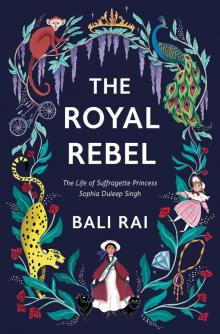 The Royal Rebel
The Royal Rebel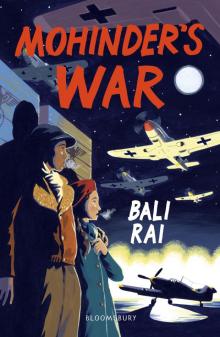 Mohinder's War
Mohinder's War Starting Eleven
Starting Eleven Glory!
Glory! (Un)arranged Marriage
(Un)arranged Marriage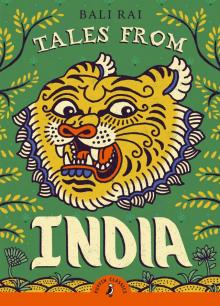 Tales from India
Tales from India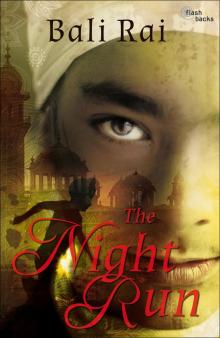 The Night Run
The Night Run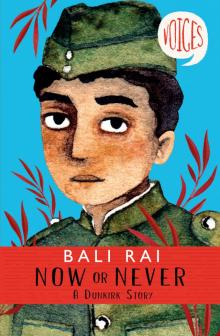 Voices: Now or Never
Voices: Now or Never Rani and Sukh
Rani and Sukh Stars!
Stars!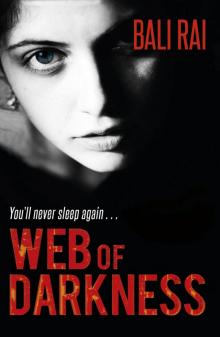 Web of Darkness
Web of Darkness The Crew
The Crew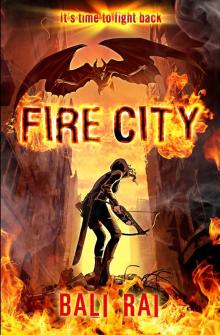 Fire City
Fire City The Last Taboo
The Last Taboo